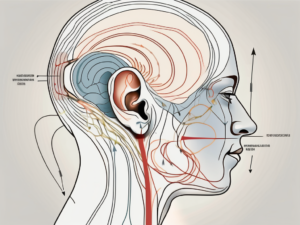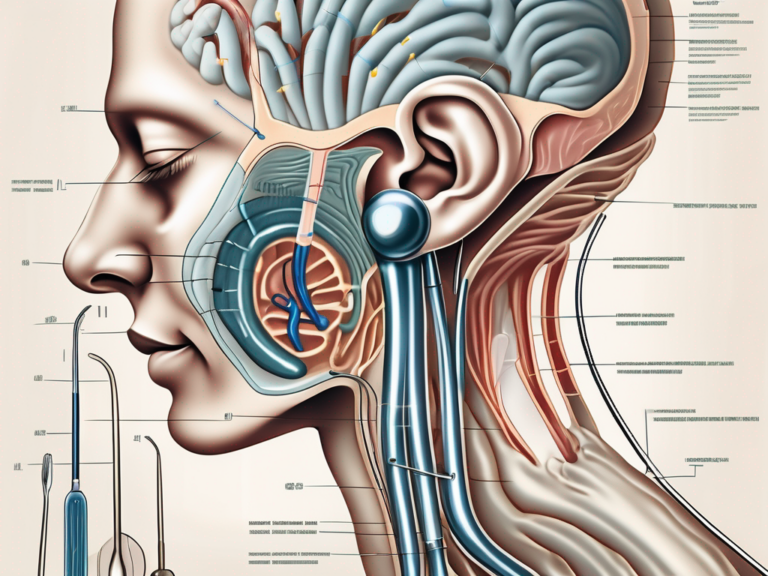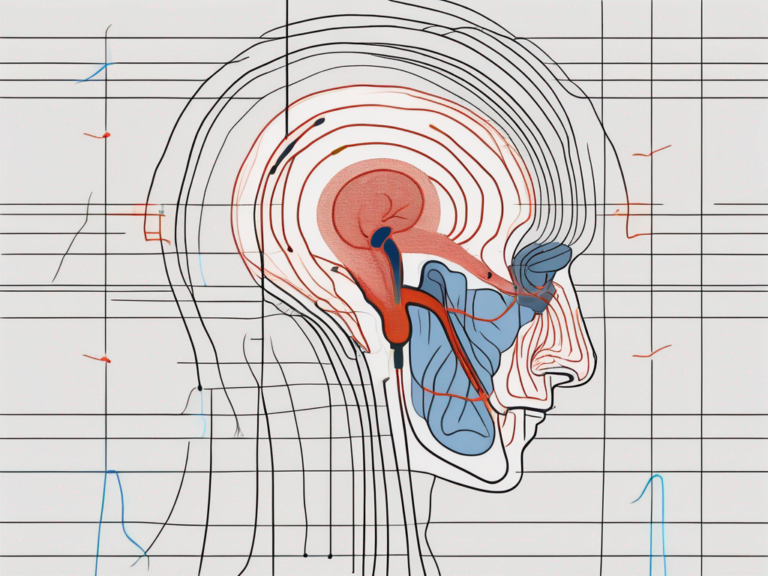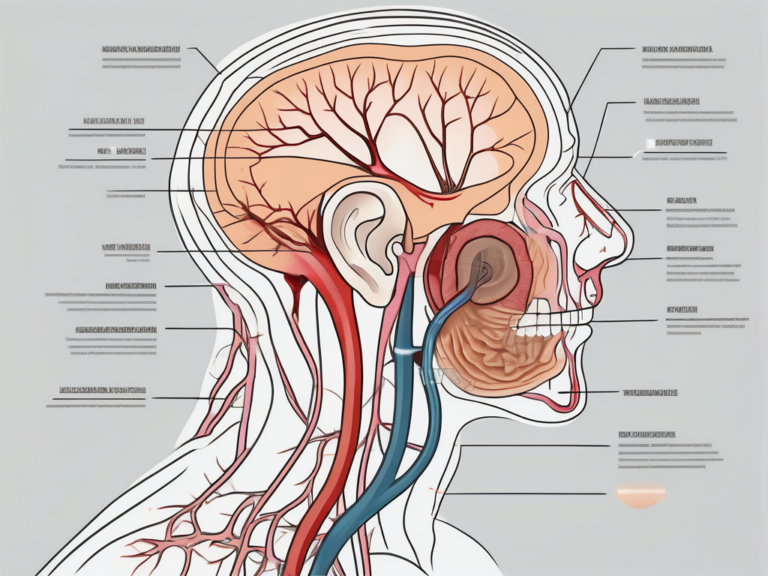Vestibular nerve irritation, also known as vestibular neuritis or vestibular neuropathy, is a condition that affects the vestibular nerve, a crucial component of the inner ear responsible for transmitting sensory information about balance and spatial orientation to the brain. This condition can have a significant impact on an individual’s quality of life, leading to symptoms such as dizziness, vertigo, and problems with coordination.
Understanding the Vestibular Nerve
The vestibular nerve, also referred to as the eighth cranial nerve or the vestibulocochlear nerve, is a vital part of the vestibular system. This complex network of structures in the inner ear is responsible for detecting head movements and providing the brain with information needed to maintain balance and equilibrium.
The vestibular system is an intricate system that consists of the vestibular organs, which include the utricle, saccule, and three semicircular canals. These organs contain tiny hair cells that are sensitive to movement and changes in position. When the head moves, the fluid inside the semicircular canals moves, causing the hair cells to bend and send signals to the brain through the vestibular nerve.
Anatomy of the Vestibular Nerve
The vestibular nerve consists of two main parts: the superior vestibular nerve and the inferior vestibular nerve. These nerve fibers originate from the vestibular ganglion, situated within the inner ear, and then travel through the internal auditory canal before reaching the brainstem.
Once in the brainstem, the vestibular nerve connects with various brain structures, including the vestibular nuclei, cerebellum, and other parts of the central nervous system, ensuring the integration of sensory input and proper coordination of movements.
The vestibular ganglion is a cluster of nerve cell bodies located near the inner ear. It contains the cell bodies of the sensory neurons that transmit information from the vestibular organs to the brain. These sensory neurons have long, slender projections called axons, which bundle together to form the vestibular nerve.
Function of the Vestibular Nerve
The vestibular nerve plays a crucial role in maintaining balance and equilibrium. It detects signals related to head position, acceleration, and rotational movements, allowing the brain to create a precise spatial representation of the body’s position in relation to the surrounding environment.
When you move your head, the vestibular nerve sends signals to the brain about the direction and speed of the movement. This information is then processed and used to adjust muscle activity and maintain balance. For example, if you tilt your head to the side, the vestibular nerve detects the change in position and sends signals to the muscles in your neck and back to help you stay upright.
Additionally, the vestibular nerve coordinates with the visual system and proprioception, the body’s ability to sense its position and movement. This integration of information is vital for various activities, including walking, driving, and maintaining posture.
When the vestibular nerve is damaged or not functioning properly, it can lead to balance problems, dizziness, vertigo, and other symptoms. Conditions such as vestibular neuritis, Meniere’s disease, and benign paroxysmal positional vertigo (BPPV) can affect the function of the vestibular nerve and disrupt the body’s sense of balance.
In conclusion, the vestibular nerve is a crucial component of the vestibular system, responsible for detecting head movements and providing the brain with information needed to maintain balance and equilibrium. Understanding the anatomy and function of the vestibular nerve helps us appreciate the complexity of our body’s ability to navigate the world around us.
Causes of Vestibular Nerve Irritation
Vestibular nerve irritation can have various causes, resulting in dysfunction and disruption of the vestibular system. While some cases may occur spontaneously, others may follow an infection, head injury, or underlying medical condition.
Infections and Vestibular Neuritis
Vestibular neuritis, a common cause of vestibular nerve irritation, often occurs as a result of a viral infection, such as the herpes simplex virus or the varicella-zoster virus.
The inflammation caused by the infection affects the vestibular nerve, leading to symptoms such as sudden vertigo, dizziness, and problems with balance. While the exact mechanisms of this condition are not fully understood, experts believe that the virus directly damages the vestibular nerve or triggers an immune response that results in nerve inflammation.
It is important to note that any suspected cases of vestibular neuritis should be promptly evaluated by a healthcare professional to rule out other potential causes and ensure appropriate treatment.
Additionally, other types of infections can also lead to vestibular nerve irritation. Bacterial infections, such as meningitis or labyrinthitis, can cause inflammation in the inner ear and affect the function of the vestibular nerve. These infections may result from untreated ear infections, sinus infections, or respiratory infections.
Furthermore, certain autoimmune disorders, such as Cogan’s syndrome or systemic lupus erythematosus, can also cause vestibular nerve irritation. In these cases, the body’s immune system mistakenly attacks the inner ear structures, including the vestibular nerve.
Meniere’s Disease and its Impact
Meniere’s disease is a chronic condition characterized by recurring episodes of vertigo, hearing loss, tinnitus (ringing in the ears), and a sensation of fullness in the affected ear.
While the exact cause of Meniere’s disease is not fully understood, it is believed to stem from abnormalities in the inner ear fluid dynamics or impaired blood flow to the ear. These changes can affect the function of the vestibular nerve, leading to irritation and the onset of vestibular symptoms.
Individuals experiencing symptoms suggestive of Meniere’s disease should seek medical evaluation to confirm the diagnosis and discuss appropriate management strategies.
In addition to Meniere’s disease, other inner ear disorders can also contribute to vestibular nerve irritation. One such condition is benign paroxysmal positional vertigo (BPPV), which occurs when tiny calcium crystals in the inner ear become dislodged and disrupt the normal balance signals sent to the brain. This can lead to episodes of vertigo and dizziness.
Furthermore, acoustic neuroma, a noncancerous tumor that develops on the vestibular nerve, can cause irritation and compression of the nerve fibers. This can result in vestibular symptoms, as well as hearing loss and facial numbness.
Head Injuries and Vestibular Nerve Damage
Head injuries, including concussions and skull fractures, can result in damage to the vestibular nerve. The sudden impact or trauma can disrupt the delicate structures within the inner ear, leading to vestibular dysfunction and subsequent irritation.
Furthermore, certain types of head injuries can also cause vestibular migraines, a condition in which the nerve pathways responsible for balance and spatial orientation become hyper-excitable and trigger recurring vestibular symptoms.
Anyone experiencing a head injury should seek immediate medical attention to assess for potential vestibular nerve damage and ensure appropriate intervention.
In addition to traumatic head injuries, chronic conditions such as whiplash can also lead to vestibular nerve irritation. Whiplash occurs when the head is forcefully jerked backward and then forward, causing strain and damage to the neck and head structures. This can affect the function of the vestibular nerve and result in symptoms such as dizziness and imbalance.
Furthermore, certain occupations or activities that involve repetitive head movements or exposure to loud noises can increase the risk of vestibular nerve irritation. Examples include professional athletes, construction workers, and musicians.
It is important to note that the causes mentioned above are not an exhaustive list, and there may be other factors contributing to vestibular nerve irritation. A thorough evaluation by a healthcare professional is essential to determine the underlying cause and develop an appropriate treatment plan.
Symptoms of Vestibular Nerve Irritation
Vestibular nerve irritation can manifest through various symptoms, affecting both the physical and emotional well-being of individuals affected by this condition.
When the vestibular nerve is irritated, it can cause a range of physical symptoms that can vary from mild to severe. These symptoms may include dizziness, which can make individuals feel like the world is spinning around them. This sensation, known as vertigo, can be extremely disorienting and can greatly impact a person’s ability to perform daily activities.
In addition to dizziness and vertigo, vestibular nerve irritation can also cause imbalance and unsteadiness. Individuals may find it difficult to maintain their balance, leading to a higher risk of falls and injuries. This can be particularly challenging when it comes to activities that require coordination and fine motor skills, such as writing or playing a musical instrument.
Furthermore, individuals with vestibular nerve irritation may experience nausea and vomiting. The constant feeling of being “off-balance” or floating can trigger these symptoms, making it difficult for individuals to eat or even perform simple tasks without feeling sick.
While the physical symptoms of vestibular nerve irritation are undoubtedly distressing, the condition can also give rise to cognitive and emotional symptoms. Many individuals experience anxiety and depression as a result of the limitations imposed by their condition. The constant fear of losing balance or experiencing a vertigo episode can be mentally exhausting and can significantly impact a person’s overall well-being.
In addition to anxiety and depression, individuals with vestibular nerve irritation may also experience cognitive symptoms. Mental fogginess, difficulty concentrating, and memory problems are common complaints among those affected by this condition. These cognitive symptoms may be attributed to a disruption in the brain’s ability to integrate and process sensory information related to balance.
Given the impact that vestibular nerve irritation can have on both physical and emotional well-being, it is crucial for individuals experiencing these symptoms to seek medical evaluation. A healthcare professional can provide a proper diagnosis and discuss appropriate strategies for managing both the physical and emotional aspects of their condition.
Diagnosis of Vestibular Nerve Irritation
Diagnosing vestibular nerve irritation involves a comprehensive evaluation, which typically includes a thorough medical history, physical examination, and various diagnostic tests and procedures.
Vestibular nerve irritation can be a complex condition, and obtaining a detailed medical and symptom history is crucial in understanding the individual’s unique situation. The healthcare professional will take the time to listen attentively and ask relevant questions to identify potential triggers or underlying conditions that may contribute to vestibular nerve irritation.
During the physical examination, the healthcare professional will carefully assess the patient’s balance, coordination, and eye movements. These assessments provide valuable insights into the function of the vestibular system, which plays a vital role in maintaining equilibrium and spatial orientation. By observing the patient’s movements and responses, the healthcare professional can gather important information about the extent and nature of the vestibular nerve irritation.
In some cases, neurologic examinations may also be conducted to rule out other potential causes of the symptoms. This comprehensive approach ensures that all possible factors contributing to the vestibular nerve irritation are thoroughly evaluated.
Diagnostic Tests and Procedures
In addition to the medical history and physical examination, various diagnostic tests and procedures can aid in confirming the diagnosis of vestibular nerve irritation and identifying the underlying cause.
An audiogram, a hearing test that measures the individual’s ability to hear sounds of different frequencies, can help assess the integrity of the auditory system and detect any associated hearing loss. This test is particularly useful in determining if the vestibular nerve irritation is accompanied by any auditory complications.
Additionally, video-nystagmography (VNG) or electronystagmography (ENG) can evaluate eye movements during specific head and body positions, providing valuable information about the function of the vestibular system. These tests involve the use of specialized equipment to monitor and record eye movements, helping to pinpoint any abnormalities or irregularities that may be contributing to the vestibular nerve irritation.
Magnetic resonance imaging (MRI) may also be recommended in certain cases to rule out other structural abnormalities within the inner ear or central nervous system that could be contributing to the symptoms. This non-invasive imaging technique allows for detailed visualization of the affected areas, helping to identify any potential underlying causes of the vestibular nerve irritation.
It is essential to consult with a healthcare professional to determine the appropriate diagnostic approach based on individual circumstances. Each case of vestibular nerve irritation is unique, and a tailored diagnostic plan will ensure accurate identification of the underlying cause and the development of an effective treatment strategy.
Treatment Options for Vestibular Nerve Irritation
The treatment of vestibular nerve irritation aims to alleviate symptoms, improve quality of life, and address any underlying causes or contributing factors. The specific approach may vary depending on the individual’s condition, the severity of symptoms, and the underlying cause.
Vestibular nerve irritation can be a challenging condition to manage, but there are various treatment options available that can provide relief and help individuals regain their balance and stability.
Medications and Therapies
In some cases, medications can be prescribed to manage the symptoms associated with vestibular nerve irritation. Anti-dizziness medications, such as antihistamines or benzodiazepines, may be prescribed to alleviate vertigo and nausea.
However, it is important to note that medication alone may not be sufficient to address the underlying cause of vestibular nerve irritation. Therefore, a comprehensive treatment plan may include a combination of medications and therapies.
Physical therapy, including vestibular rehabilitation exercises, can also be beneficial. These exercises aim to retrain the brain and improve balance, coordination, and visual stability. They may involve specific head and eye movements, as well as exercises to strengthen the muscles that support balance.
Psychological therapy, such as cognitive-behavioral therapy (CBT), may be recommended to address any cognitive or emotional symptoms associated with vestibular nerve irritation. CBT can help individuals develop coping strategies, manage anxiety or depression, and improve their overall well-being.
It is important to note that the choice of treatment will depend on the individual’s specific needs, and consulting with a healthcare professional is essential to determine the most appropriate management plan.
Surgical Interventions
In some cases, surgical interventions may be considered for individuals with severe and debilitating symptoms that do not respond to conservative treatment approaches.
Surgery for vestibular nerve irritation is typically a last resort and is only recommended when all other treatment options have been exhausted. It involves surgical procedures that aim to either remove or repair the affected vestibular nerve or its associated structures.
However, it is important to highlight that surgical interventions are typically reserved for specific situations and must be carefully evaluated on a case-by-case basis. The decision to pursue surgery should be made in consultation with a healthcare professional who specializes in vestibular disorders.
It is worth mentioning that surgical interventions, like any other medical procedure, carry risks and potential complications. Therefore, a thorough evaluation of the potential benefits and risks should be conducted before making a decision.
Furthermore, it is important to have realistic expectations about the outcomes of surgery. While it can provide relief for some individuals, it may not completely eliminate all symptoms, and additional therapies or lifestyle modifications may still be necessary post-surgery.
In conclusion, the treatment options for vestibular nerve irritation are diverse and aim to alleviate symptoms, improve quality of life, and address underlying causes. From medications and therapies to surgical interventions, each approach has its own benefits and considerations. Consulting with a healthcare professional is crucial in determining the most appropriate treatment plan for each individual.
Living with Vestibular Nerve Irritation
Living with vestibular nerve irritation can be challenging, but there are strategies and lifestyle modifications that can help individuals manage their symptoms and improve their overall well-being.
Lifestyle Modifications
Individuals with vestibular nerve irritation may find it beneficial to make certain adjustments to their daily routines and environments. This may include incorporating regular exercise, maintaining a well-balanced diet, and getting adequate rest to support overall health and well-being.
Avoiding triggers, such as excessive stress, caffeine, and alcohol, can contribute to symptom management. Additionally, creating a safe and clutter-free environment can minimize the risk of falls and make daily activities more manageable.
Coping Strategies and Support
Coping with the challenges of vestibular nerve irritation can be emotionally draining. Seeking support from family, friends, or support groups can provide individuals with a safe space to share their experiences and learn from others who are facing similar challenges.
Additionally, engaging in stress-reducing activities, such as yoga, meditation, or mindfulness practices, can help individuals manage anxiety and improve overall well-being.
While lifestyle modifications and coping strategies can be useful, it is important to reiterate the significance of consulting with a healthcare professional to tailor an individualized approach to managing vestibular nerve irritation.









+ There are no comments
Add yours